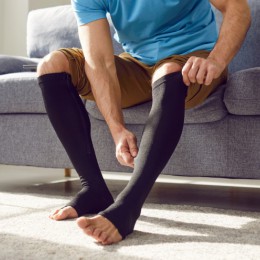
Type 2 diabetes, the most common form of diabetes, is a lifelong disease characterized by high levels of glucose in the blood. Those experiencing this disease face many additional challenges beyond diabetes itself. One of these challenges is the increased occurrence and severity of both fecal and urinary incontinence.
Several aspects connect diabetes and incontinence, but the increased incidence of obesity in diabetics can be considered the main cause. Increased weight, especially in the abdomen, places excessive strain on the muscles of the pelvic floor that control bladder function.
This strain or pressure causes involuntary urine leakage, and this type of urinary incontinence is called stress incontinence. Any movements that increase pressure in the abdominal area such as coughing, sneezing, laughing, physical activity, etc. will cause the leakage of small amounts of urine.
Another factor linking diabetes to urinary incontinence is the effect diabetes may have on nerve function in the bladder. Damaged nerves can cause overactive bladder or urge incontinence.
Urge incontinence is when the muscular wall in the bladder has a sudden contraction causing the urge to urinate and sometimes the loss of urine. Fast movements and activities like sitting and standing can trigger urge incontinence. Nerve damage caused by diabetes may also cause a loss of bladder sensation and weakened pelvic floor muscles creating the inability to completely empty the bladder.
If a diabetic's muscles and nerves become too damaged and fail to ever cause bladder contractions, overflow incontinence will occur. With overflow incontinence, the bladder never empties and continuously leaks. An early warning sign of the onset of overflow incontinence is a slow or timid stream of urine while using the restroom.
Other reasons why many diabetics develop fecal or urinary incontinence include:
- Constipation- Over half of those with diabetes experience constipation which makes it difficult to pass urine.
- High Blood Glucose Levels- Improperly controlled diabetes causes glucose in the blood to run very high. A person's body will attempt to eliminate the sugars through the urine causing a large amount of urine to be produced.
- Water Retention- Water held in a diabetic's lower body caused by coronary artery disease can increase the production of urine at night. This leads to frequent urination during the night and even bedwetting.
- Lack of Mobility- Diabetes can come with serious side effects that can decrease mobility. Amputation, vision deterioration, and deep pains in the limbs can prevent people from reaching the toilet in time causing urine leakage.
- Diabetic Medications- Some medications used to treat diabetes can have side effects that lend themselves to the onset of incontinence. These may cause weight gain, fluid retention, bladder nerve damage, and even incontinence itself.
To treat and control diabetes-related fecal or urinary incontinence, the proper management of blood glucose levels must be maintained. Also, every step necessary must be taken to keep body weight in the normal range. A proper diet and exercise regime will not only help maintain healthy body weight, but it can also help maintain healthy blood glucose levels as well. Pharmacological interventions may also be necessary to treat diabetes-related incontinence.
Experts at a health care center or medical equipment supply company can help diabetics find the best hospital grade products to provide them with a discreet fit and proper protection level. They treat customers to personal customer service and are available continuously through toll-free phone numbers, in stores, or online.
A few reputable health care centers and medical equipment supply companies also offer discreet incontinence supply home delivery programs. Customers save money by utilizing their sample programs and receive meaningful discounts for ordering their urinary incontinence products in volume. In addition, they also save time by having them delivered right to their doorstep each month. Contact us for program details!





0 comments